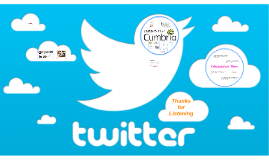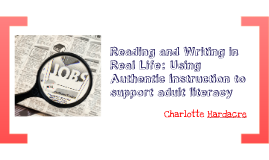Present Remotely
 Send the link below via email or IM
Send the link below via email or IM
 Present to your audience
Present to your audience
- Invited audience members will follow you as you navigate and present
- People invited to a presentation do not need a Prezi account
- This link expires 10 minutes after you close the presentation
- A maximum of 30 users can follow your presentation
- Learn more about this feature in our knowledge base article
Do you really want to delete this prezi?
Neither you, nor the coeditors you shared it with will be able to recover it again.
Make your likes visible on Facebook?
Connect your Facebook account to Prezi and let your likes appear on your timeline.
You can change this under Settings & Account at any time.
Seminar: Reading and Writing in Real Life 2017
No description
by
TweetCharlotte Hardacre
on 4 April 2017Transcript of Seminar: Reading and Writing in Real Life 2017
Whose Interests?
Habermas, Freire & Illich.
These critical theorists advocate emanicpatory education. They would aim to uncover the INTERESTS at work in teaching and interrogate the legitimcy of these interests; identifying the extent to which they serve equality and democracy.
Family Literacy
Classroom
Adult Literacy
Classroom
I taught in two settings.
Family Learning funding requires organisations to meet certain "community learning measures" but measures "achievement" through tutor discretion. There are a range of methods to meet learning aims. Including written work, photographs, video and displays.
The SFA measures achievement through how many learners acheive a qualification. The qualification is acheived by passing a test. Up until 2011 this was The National Test - a multiple choice exam that did not have a free writing element. Now, it is the functional skills exams.
Cash for Qualifications
Community Learning
Fund
“distorting the educational process, narrowing the curriculum, and conflicting with the goals of meaningful education.” (Ravitch, 2011)
Learner
Improve literacy?
Acheive a certificate to gain entry for their next course
Tutor
Job security
Positive feedback from employer
Job satisfaction?
Educational Organisation
Meet Government targets
Secure funding
In response to calls from employers Functional Skills are intended to produce a workforce that is enterprising, productive and equipped to compete in business.
AQA Examining Board
what interest does the
have in being taught to pass the test?
The Reality of Teaching to the Test
My intake of learners all held Level 1 Adult Literacy
qualifications. This means they spent one year being
drilled to pass the National Test -a criteria-referenced standardised assessment that takes the form of a 40 question multiple choice exam.
My diagnostic assessment
of these learners writing
ability showed they were ALL
at least two levels below L1.
Did we serve their interests?
This learner knows how to read and write. By asking them to go line by line through a piece of text to correct errors is a painstaking and de-motivating exercise for tutor and learner.
Out of Context
Social Justice in Action
Reading and Writing in Real Life: Using Authentic Instruction to support adult literacy
Charlotte Hardacre
Inauthentic use of texts
Develops Strange skills
When was the last time you hand-wrote an email?
Hand write the address here!
Should I be a part of this?
In doing Action Research we are aiming not just for right ways of
doing
but for right ways of
being
.
McNiff (2009)
Time for an intervention!
Does it have to be this way?
2. In what ways do adult learners experience the introduction of Authentic Instruction in this action research?
“What so we can read the paper or we can, like write all our complaint letters to the council or whatever in lessons and you’re gonna help us. That’s sound.”
The observer noted another learner saying in response to this:
“You don’t get to read the paper in the exam though do you”
A tone was set early in the intervention of reading and writing either for individual gain; CVs, covering letters, complaint letters or to affect changes in society; letters to councils, the Government and housing associations.
There was also, by week 4, a closer focus on form and accuracy of the text. Learners did not want to simply hand the work in and await their mark. They preferred to hone the text to a particular standard in collaboration with me or with another learner.
The focused observer noted: “there is a very positive atmosphere in the sessions now. Sharing work and helping each other seems to be the accepted norm. Learners feel they are producing something important not just work for the teacher”
Pay No Attention
To That Man Behind The Curtain!
Thanks for Listening
A flavour of how it went...
2014 Examples
Where do you teach?
1 Thing I like about WHAT I teach - not your subject but the discrete things you teach
i.e. how to write a letter
1 Thing I like about HOW you teach - your style and approach
1 thing you like about the summative assessment you use
1 Thing I DON'T like about WHAT I teach
1 Thing I DON'T like about HOW you teach
1 thing I DON'T like about the summative assessment you use
Which exam boards do you use?
Authentic Instruction To Do List
1. Distribute a questionnaire or have a group discussion in order to find out the real-life reading and writing your learners already do
2. Map these activities to your assessments.
So, if students want to write letters then write letters and send them.
If they want to send an email then write an email and send it.
If you know you need to cover "presentational devices consider which activities suit this. Such as, making real flyers for a real event
Work on making the in-classroom activities meaningful and socially situated.
4. It's your learners task to tell you what they read and write in real life and it is your job to work out how these can be assessed
The aim is to raise critical consciousness so learners no longer complete tasks which are disconnected from real life literacy practices
A good starting point is to talk to your learners using these discussion questions.
How can we use reading and writing to:
Connect with our community
Engage in a favourite passtime
Research a topic we find interesting
Interact with our friends and family
Get things done that need doing
How can we use reading and writing to:
Connect with our community
Engage in a favourite passtime
Research a topic we find interesting
Interact with our friends and family
Get things done that need doing
Would this constitute an authentic approach?
Be good at reading and writing.
No matter what it is you're reading or writing.
2017 Examples
Discussion Point
I've been doing some work to understand what authenticity means in practice. Asking how we enact it.
Have you encountered inauthenticiy in your practice?
Do you think the audience matters? Does power play a part?
Suggestions Welcome
Drivers?
Resistors
Is school-only authentic in its own way?
Is it the teacher's role to make tasks meaningful?
1. In what ways does Authentic Instruction offer anything different to adult literacy than the Functional or Social Practices approach?
3. What are the implications for the organisation in choosing Authentic Instruction over a Functional Skills approach?
Full transcriptHabermas, Freire & Illich.
These critical theorists advocate emanicpatory education. They would aim to uncover the INTERESTS at work in teaching and interrogate the legitimcy of these interests; identifying the extent to which they serve equality and democracy.
Family Literacy
Classroom
Adult Literacy
Classroom
I taught in two settings.
Family Learning funding requires organisations to meet certain "community learning measures" but measures "achievement" through tutor discretion. There are a range of methods to meet learning aims. Including written work, photographs, video and displays.
The SFA measures achievement through how many learners acheive a qualification. The qualification is acheived by passing a test. Up until 2011 this was The National Test - a multiple choice exam that did not have a free writing element. Now, it is the functional skills exams.
Cash for Qualifications
Community Learning
Fund
“distorting the educational process, narrowing the curriculum, and conflicting with the goals of meaningful education.” (Ravitch, 2011)
Learner
Improve literacy?
Acheive a certificate to gain entry for their next course
Tutor
Job security
Positive feedback from employer
Job satisfaction?
Educational Organisation
Meet Government targets
Secure funding
In response to calls from employers Functional Skills are intended to produce a workforce that is enterprising, productive and equipped to compete in business.
AQA Examining Board
what interest does the
have in being taught to pass the test?
The Reality of Teaching to the Test
My intake of learners all held Level 1 Adult Literacy
qualifications. This means they spent one year being
drilled to pass the National Test -a criteria-referenced standardised assessment that takes the form of a 40 question multiple choice exam.
My diagnostic assessment
of these learners writing
ability showed they were ALL
at least two levels below L1.
Did we serve their interests?
This learner knows how to read and write. By asking them to go line by line through a piece of text to correct errors is a painstaking and de-motivating exercise for tutor and learner.
Out of Context
Social Justice in Action
Reading and Writing in Real Life: Using Authentic Instruction to support adult literacy
Charlotte Hardacre
Inauthentic use of texts
Develops Strange skills
When was the last time you hand-wrote an email?
Hand write the address here!
Should I be a part of this?
In doing Action Research we are aiming not just for right ways of
doing
but for right ways of
being
.
McNiff (2009)
Time for an intervention!
Does it have to be this way?
2. In what ways do adult learners experience the introduction of Authentic Instruction in this action research?
“What so we can read the paper or we can, like write all our complaint letters to the council or whatever in lessons and you’re gonna help us. That’s sound.”
The observer noted another learner saying in response to this:
“You don’t get to read the paper in the exam though do you”
A tone was set early in the intervention of reading and writing either for individual gain; CVs, covering letters, complaint letters or to affect changes in society; letters to councils, the Government and housing associations.
There was also, by week 4, a closer focus on form and accuracy of the text. Learners did not want to simply hand the work in and await their mark. They preferred to hone the text to a particular standard in collaboration with me or with another learner.
The focused observer noted: “there is a very positive atmosphere in the sessions now. Sharing work and helping each other seems to be the accepted norm. Learners feel they are producing something important not just work for the teacher”
Pay No Attention
To That Man Behind The Curtain!
Thanks for Listening
A flavour of how it went...
2014 Examples
Where do you teach?
1 Thing I like about WHAT I teach - not your subject but the discrete things you teach
i.e. how to write a letter
1 Thing I like about HOW you teach - your style and approach
1 thing you like about the summative assessment you use
1 Thing I DON'T like about WHAT I teach
1 Thing I DON'T like about HOW you teach
1 thing I DON'T like about the summative assessment you use
Which exam boards do you use?
Authentic Instruction To Do List
1. Distribute a questionnaire or have a group discussion in order to find out the real-life reading and writing your learners already do
2. Map these activities to your assessments.
So, if students want to write letters then write letters and send them.
If they want to send an email then write an email and send it.
If you know you need to cover "presentational devices consider which activities suit this. Such as, making real flyers for a real event
Work on making the in-classroom activities meaningful and socially situated.
4. It's your learners task to tell you what they read and write in real life and it is your job to work out how these can be assessed
The aim is to raise critical consciousness so learners no longer complete tasks which are disconnected from real life literacy practices
A good starting point is to talk to your learners using these discussion questions.
How can we use reading and writing to:
Connect with our community
Engage in a favourite passtime
Research a topic we find interesting
Interact with our friends and family
Get things done that need doing
How can we use reading and writing to:
Connect with our community
Engage in a favourite passtime
Research a topic we find interesting
Interact with our friends and family
Get things done that need doing
Would this constitute an authentic approach?
Be good at reading and writing.
No matter what it is you're reading or writing.
2017 Examples
Discussion Point
I've been doing some work to understand what authenticity means in practice. Asking how we enact it.
Have you encountered inauthenticiy in your practice?
Do you think the audience matters? Does power play a part?
Suggestions Welcome
Drivers?
Resistors
Is school-only authentic in its own way?
Is it the teacher's role to make tasks meaningful?
1. In what ways does Authentic Instruction offer anything different to adult literacy than the Functional or Social Practices approach?
3. What are the implications for the organisation in choosing Authentic Instruction over a Functional Skills approach?




